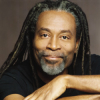Bobby McFerrin

Bobby McFerrin
Robert Keith "Bobby" McFerrin Jr.is an American jazz vocalist and conductor. He is a ten-time Grammy Award winner, who is known for his unique vocal techniques, such as singing fluidly but with quick and considerable jumps in pitch—for example, sustaining a melody while also rapidly alternating with arpeggios and harmonies—as well as scat singing, polyphonic overtone singing, and improvisational vocal percussion. He is widely known for performing and recording regularly as an unaccompanied solo vocal artist. He has frequently collaborated...
NationalityAmerican
ProfessionPop Singer
Date of Birth11 March 1950
CityNew York City, NY
CountryUnited States of America
I've got one week left, and then I'm done for a year. I haven't had a sabbatical, I haven't taken a year off from touring in 15 years at least.
So I went to California State University, the composition department, and I studied composition and orchestration and things like that.
And I just automatically said music. I hadn't really thought about it, but I thought, well I guess I'll be a musician. It was pretty much like that.
Then when I was in grammar school I played the clarinet, and then, after clarinet I played the flute in college orchestra - besides singing in the college chorus and things like that.
Then I left that school and I went to Cerritos College, which was in southern California; they had one of the best big band programs in the country at the time.
If I can bring joy into the world, if I can get people to stop thinking about their pain for a moment, or the fact the tomorrow morning they're going to get up and tell their boss off... then I'll be successful.
I like to use the audience as my color palette, my instrument.
Remembering that life can be full of surprises is useful in any part of your life. You can try a new way of singing a song you've performed for years, a new way of showing your family your love for them, or a new recipe. Don't just play the licks you know. We're all improvising all the time - it's good to recognize that and embrace it.
I'm not a scholar or a psychologist, so I don't really think about why. But I do think about what it means to sing to and with people, to offer music to them, and to ask them to spend time with me.
If I stand there, appreciating the world around me as full of amazing sounds and the possibility of new ones, I think that invites other people to see the world that way, too. I love sharing the experience of singing with people, and I love sharing my stories. But when it comes to teaching, I have a lot of help.
I think play and joy and feeling good deserve more of our time. I don't see why adults are supposed to grow out of those things. If I have a mission it's to make everyone who comes to my concerts leave feeling a heightened sense of freedom to play, sing, and enjoy themselves.
When we listen to improvisational jazz, or solo classical violinists, the way they phrase and inflect melodies feels vocal, like they're talking to us. When I was figuring out how to perform solo, I wanted to move back and forth between bass riffs, melody, and harmony, so I often used sounds instead of - or alongside - the words of a song. I found that if I sang a line using the consonants, vowels, shadings, and inflection we recognize as human language sounds, people responded as if I were talking to them.
Inviting audiences to open up and hear things differently is an important part of what I do. But I still love to sing songs with words, too.
I want to write a book of poetry, as well as children's stories.